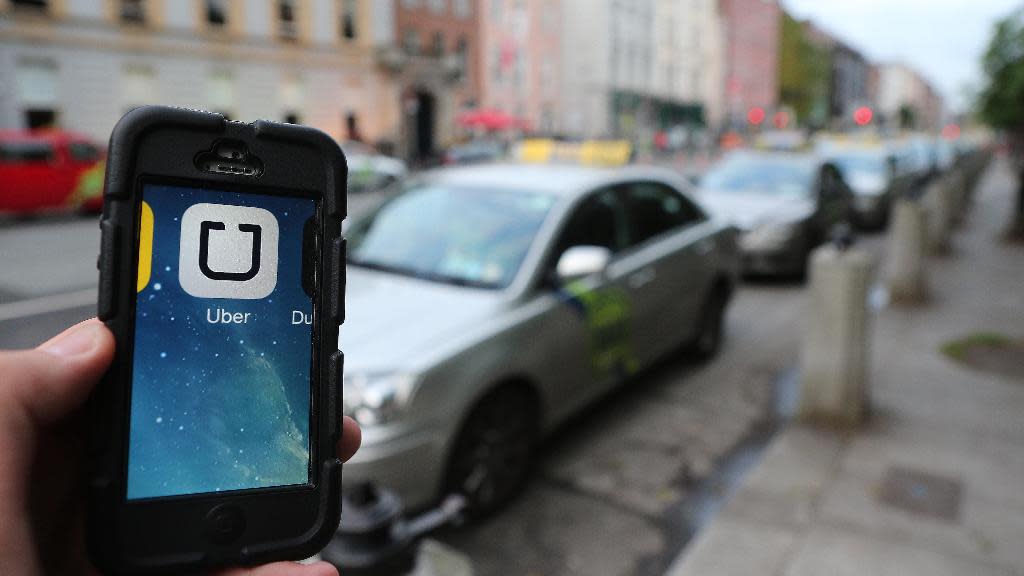 Daily Brew
Daily BrewUber facing a rough ride in Canada and abroad

Toronto taxi drivers are threatening to gridlock the city during the upcoming Pan Am Games to force officials to put the brakes on the controversial ride-share company Uber, which is facing growing opposition in Canada, Europe and Asia.
Sajid Mughal, spokesman for the iTaxiworkers Association, says Uber drivers have taken between 40 and 50 per cent of cab business in Toronto as city and police turn a blind eye to bylaws that would curtail the company.
“UberX is taking most of the cab business and the cab drivers are suffering,” Mughal tells Yahoo Canada News. “The city is not doing its job.”
He says cab drivers have not made a final decision on when they will block streets in protest – or even if they will – but they will meet in the next few days to decide. The Pan Am Games begin July 10.
“Drivers are so frustrated by now that they are thinking of taking action against Uber,” Mughal says. “If the city is not taking any action, we have to raise our voice. We don’t want anything to happen like in France but we want to show the mayor and the [police] chief we are suffering, and please stop Uber’s illegal activities.”
Uber officials did not respond to a request for comment. The company provides a smartphone app that allows drivers and passengers to sign up for a ride-share service. Launched five years ago, it now operates in 300 cities in 57 countries.
The City of Toronto has gone to court seeking an injunction to shut down Uber’s operations, claiming that Uber is operating illegally.
Company lawyers argued in court that it does not need to be licenced as a taxi brokerage because it does not dispatch drivers, but simply operates a ride-sharing app that connects drivers with riders.
Ontario Superior Court hearings wrapped up last month and the decision is pending.
A Toronto official says the city’s position is that Uber is required to have a taxicab brokerage or limousine service company licence in order to operate in Toronto.
“Whether the City does, in fact, have legal grounds to restrict Uber from operating without a municipally issued licence is precisely the question to be determined by The Honourable Justice Dunphy,” Tracey Cook, executive director of municipal licensing and standards for Toronto, says in an emailed statement.
“We do not know when Justice Dunphy will render his decision. Once the decision is rendered, appropriate next steps will be determined.”
Toronto is not the only Canadian city contending with Uber’s arrival on it streets.
In April, an Alberta court rejected the City of Edmonton’s request for a similar injunction against the ride-sharing app.
“Uber Canada itself does not permit drivers to operate vehicles for hire,” wrote Justice Michelle Crighton in her decision. “In fact, Uber Canada has no direct communication with riders or drivers and no control over any driver’s decision to drive or not.”
In May, Quebec tax authorities raided the Montreal offices of Uber. Municipal and provincial officials maintain the ride-share system is illegal, yet it continues to operate.
However, Toronto et al may be the least of Uber’s worries.
The company suspended its service in France on Friday in the midst of sometimes violent protests by French taxi drivers.
Uber is embroiled in that country in a legal dispute with French authorities and two European managers were detained Monday and ordered to stand trial, charged with “deceptive commercial practices.”
French officials had ordered Uber shut down pending a legal decision at a top French court.
In India, New Delhi officials banned the service last year following the rape of a female passenger by a Uber driver and in January Chinese authorities banned all ride-sharing apps.
Even at home the San Francisco-based company is getting a rough ride.
According to media report, the U.S. Department of Justice is investigating Uber’s auto-loan program, which purportedly encourages drivers with poor credit ratings to take out subprime loans – the same kind that prompted the housing collapse and financial crisis in 2008.
And last year, labour lawyer Shannon Liss-Riordan filed a class-action lawsuit, alleging the company skirts labour laws by classifying itself a technology company and drivers as contractors.
The case will go to trial for class certification in August.
More from Yahoo Canada News:


